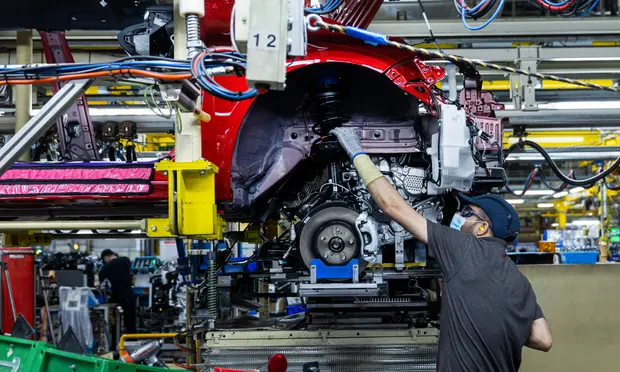Increasing Interest Rates Will Hurt The UK Economy, Output Shows.
According to the latest private sector activity snapshot, growth in the UK economy is expected to slow even further as a result of the expected rate increases later this year, which will negatively impact a country that is already expanding at its slowest pace since escaping the lockdown in 2021.
Increasing Interest Rates Will Hurt The UK Economy, Output Shows
Despite the fact that the UK is performing slightly better than the eurozone or the US, S&P Global/Chartered Institute of Procurement and Supply (CIPS)’s latest monthly survey shows the manufacturing and services sectors are both struggling to cope with the rising cost of living pressures.
As a result of the steep rise in commodity prices, manufacturers have experienced their first contraction of manufacturing output since May 2020, when the pandemic was still in its early stages.
Despite the high inflation rate of 9.4%, which is the highest in 40 years, there is some evidence from the survey that there has been an easing of the global price pressures that have contributed to the UK’s high inflation rate. The second month of lower input cost prices has been witnessed, marking the lowest price since September 2021 for the second time in a row.
As a result of the survey, companies who responded indicated that lower commodity prices, especially metals, were beginning to have an impact on their costs, but service sector firms mostly indicated that intense wage pressures due to a shortage of staff and rising inflation had continued to raise their prices.
Yet, analysts said there are signs that there has been a turning point in the economy. The Bank of England is likely to be cheered by the news that cost pressures have abated and firms are slowing the pace of price increases as a result of weak demand for goods and services, said Samuel Tombs, the UK economist at the consultancy Pantheon Macro.
The Governor of the Bank of England, Andrew Bailey, has said that there is a possibility that the cost of borrowing will rise by half a point in the coming months, but the S&P/Cips purchasing managers’ index indicates that Threadneedle Street will be tightening policy at a time when the economy is at its most vulnerable in 17 months.
There were no improvements in service sector activity in June, while manufacturing declined from 50.3 to 49.7, while the composite output index fell from 53.7 to 52.8 in July, in line with the decline in service sector activity cited above.
As a general rule, a reading below 50 suggests a contraction rather than an expansion of the economy.
The survey shows that there has been a slowdown in the rate at which new jobs are being created as a result of efforts to clear up backlogs of orders.
It is said that in July, the UK economy slowed to a crawl, registering the slowest expansion since the lockdowns of early 2021, according to senior business economist Chris Williamson at S&P Global Market Intelligence.
As a result of pent-up demand for vehicles and consumer-oriented services such as travel and tourism, the PMI in July is at a level that is consistent with just 0.2% growth in GDP in spite of the fact that the economy is not yet in decline.
There are forward-looking indicators that suggest that the situation may get worse in the future.”
Several PMIs showed that the U.S. and the eurozone were both already experiencing recessions, according to separate PMIs.
This is the lowest level in 26 months for America’s composite PMI score, which dropped from 52.3 to 47.5 in July. Manufacturing and services declined at the steepest rate since the start of the pandemic, as a result of a decrease in demand, which is one of the reasons for the decline.
The United States is currently experiencing a 9.1% inflation rate, and in response to this, its central bank – the Federal Reserve – has raised interest rates to keep inflation in check.
In the last month, official borrowing costs have risen by 0.75 percentage points, and on Wednesday, the government expects the rate to rise by the same amount.

